Can’t be too many of these records around.
“This is a Promotional Item Card Board Record 78 RPM around 1960. Very Rare Item !”
Can’t be too many of these records around.
“This is a Promotional Item Card Board Record 78 RPM around 1960. Very Rare Item !”
This photo shows off a unique full hardtop. It looks like the top is magnifying the antenna.
“Original factory photograph , 8 x 10 , 3 original stamps on reverse , ” Lawless & Son , Houston , Texas ” , “Koenig Iron Works , Houston , Texas ” .”
Here’s an instruction set for the Koenig Jibby Cab.
“original Non Color Folder , 8.5 x 11 Folded , 17 x 11 Unfolded , No Cars Shown , Installation Instructions For Jiffy Cabs , Models 520 Full And 525 Half For CJ-5 , And Models 620 Full And 525 Half For CJ-6”
UPDATE: There’s a new website for the magazine: https://www.dispatchermagazine.com
Norris-Banonis just released their Spring 2017 issue of their Dispatcher magazine. It’s their third year of publication and the unique articles continue. Topics covered in this issue include a review of Bill Spears’ War Baby by Fred Caldwell, an article by Jim Allen on the Jeep Honcho, a piece on the Esslingen Ordnance, the first of a two-part article on Charlie Wilson and the Wilson Foundary and more. If you haven’t subscribed yet, check it out at http://norris-banonis.com/dispatcher.html.
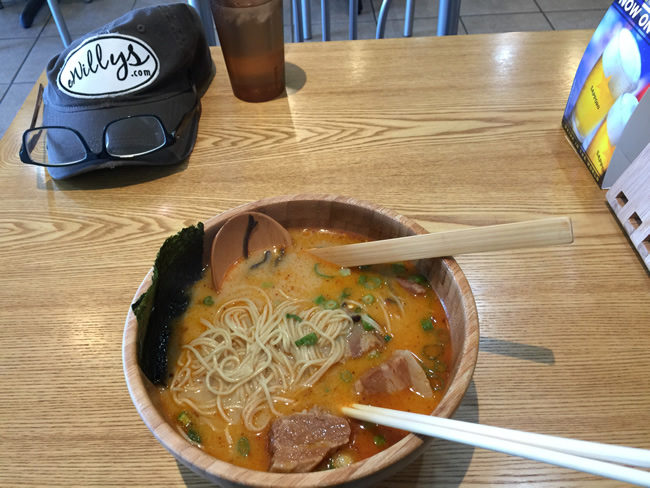
All work and no noodles makes David grumpy! Good thing I found a new Ramen noodle place just a few minutes away from my parents. I had them add some pork belly. It was awesome!
More progress on Rusty, one part at a time. I wanted to remove the u-joints so I could sand blast and paint the driveline.
To remove them, I used my favorite vice, something that’s been around longer than me. Using two different sized sockets (one to slide through and one to catch the u-joint as it slides through, I pressed it through. Make sure the grease nipple is NOT on the side you are pressing or it will cause you problems. This shows the u-joint after the springs are removed, but before I began pressing.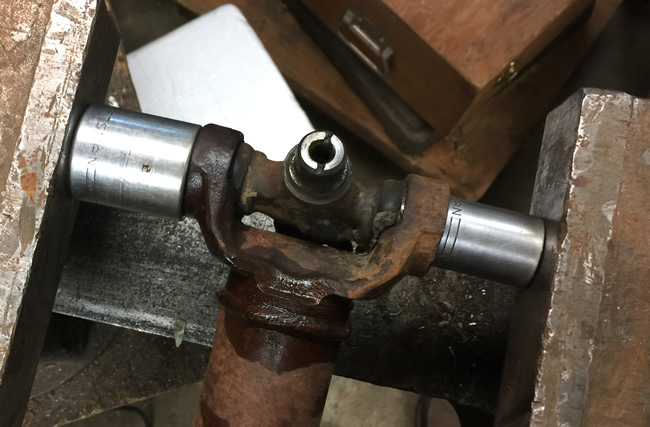
This CJ-3B body was built from brass by a company in India. The company shared the photos on Facebook.
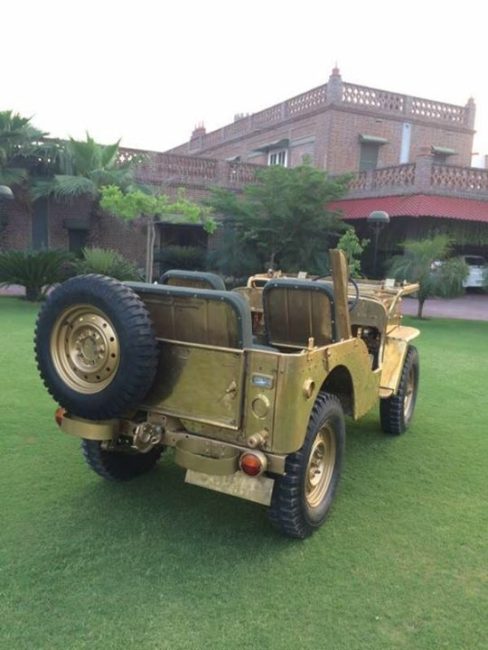
Great photo.
“1945 PRESS PHOTO Army Jeep Coming Out Of Amphibious Water Buffalo Tractor 4494 Measures 7.5 X 9.5 inches”
Scramboleer Dan took the time to assemble these vintage newspapers ads for the Traveller (sorry it took me so long to get these posted!).
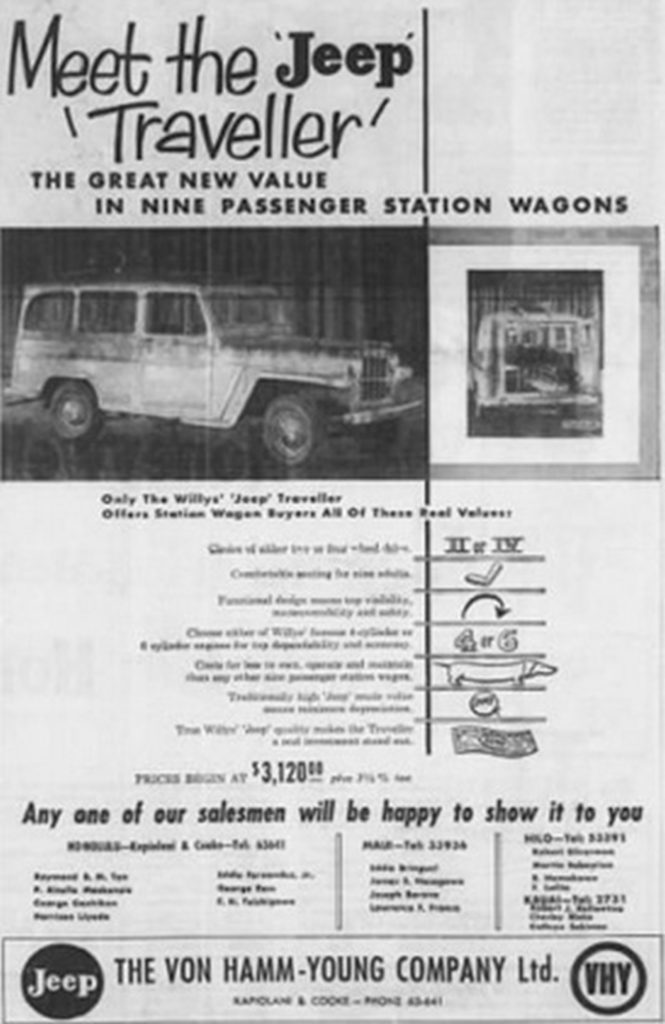
October 1, 1959, pg 15 of the Honolulu Star-Bulletin
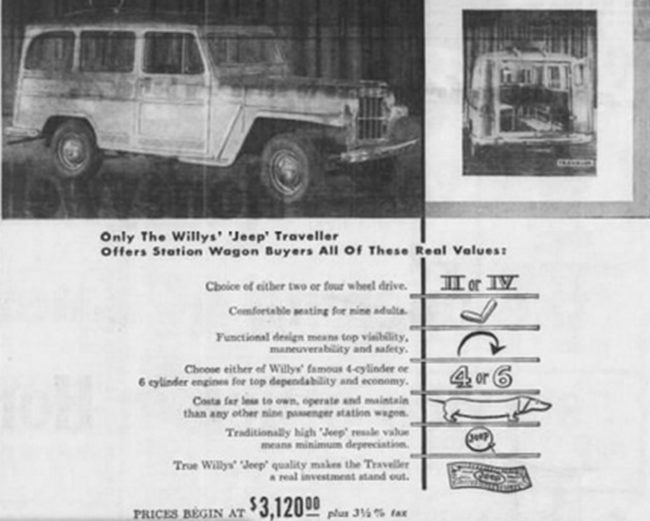
Honolulu Star-Bulletin
A few years later we have some used Willys prices:
Short update. On Tuesday, after buying some parts and fixing some wiring, I got mom’s riding lawn mower running. She’s happy. I am happy.
On Wednesday, after buying a new motor and then upgrading the wiring to 230 … (It sure wasn’t plug and play) … I got the compressor working. I am even happier!
Compressor done? Check …
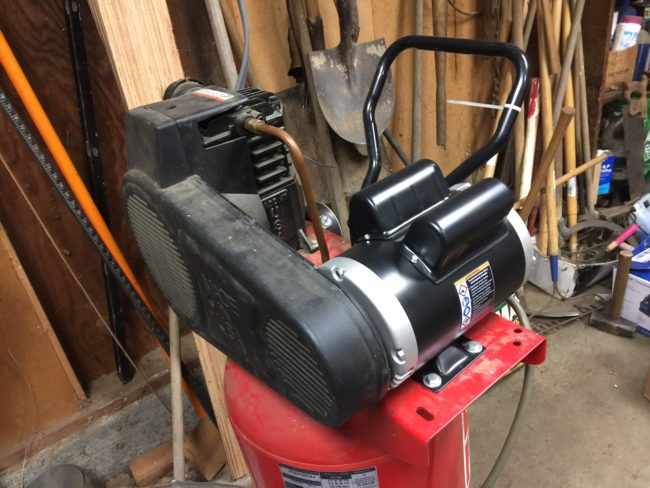
Parts ready? Check …
Parts blasted? Check …
Nice to be making headway again.
Just a couple posts for today … I spent yesterday morning working on my parents’ mower (an annual event). There was cursing and cussing (don’t know that there is a difference, but i uttered enough to fill both categories). After fixing a highly corroded wire and testing other parts, I finally concluded the solenoid needed replacing. I’ll be picking that up today.
I left that project for a trip to Edgewood, Washington, where I met Ron, a man selling his father-in-law’s 1991 Jeep Wrangler. Why was I looking a Wrangler? I’m helping the Vidal’s locate a newer jeep for their trip to Alaska. The price on this one was pretty good and the pictures showed well, such as this example photo: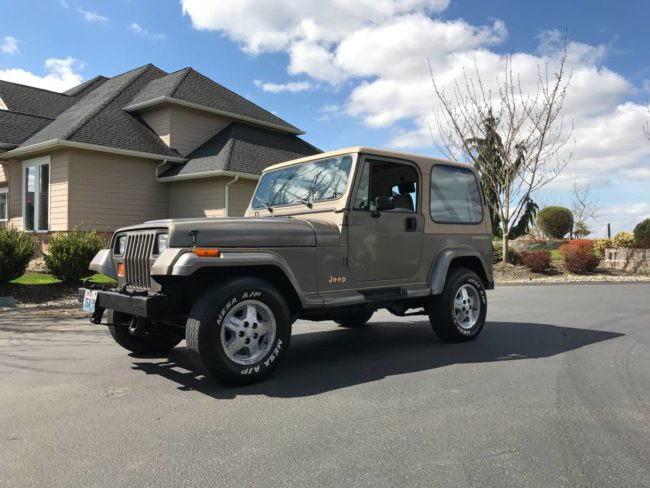
But, in person, there were dings, scratches, and plenty of imperfections. The man I met claimed the jeep was well-cared for, yet the shift boot was sticky all over with something, the floor was very black, as if it had just been painted (and their was overspray onto the roll bar), and the battery tie down was hanging from some wires across the engine compartment from where the battery was located. Something didn’t sit well with me about the deal (the seller was even ready to drop the price, despite all the calls he said he had on it), so I passed.
From there, I dropped by Rob and Diana Stafford’s place, where I looked through some of the giveaway items that the PNW4WDA, which will become an official sponsor, donated to the Alaska Or Rust venture. There were all kinds of t-shits, sweatshirts, hoodies, drink containers, and more.
Then Diana showed me Rob’s progress on his flat fender rebuild. He was just going to do a few things to the flattie for the Alaska trip, but when he looked under the body, he realized his trail jeep needed a new one. I took a closeup look at the body’s old floor and I have to say that it was worse than Rusty’s floor! But now, with that new body, he’s definitely ahead of me!
Steve spotted this interesting photo with multiple Willys Slat Grille MBs.
“1942 PRESS PHOTO Army Armored Scout Car White Motor Co Cleveland Jeeps 4507 Measures 7 X 9 inches”
There’s nothing like disassembly to reveal all the problems that remained unseen. Once the body came off, the realities revealed themselves.
The front cross member is cracked on the driver’s side (no surprise there — funny how I didn’t notice it with the body on it). The transmission is so packed with muck that I doubt any oil could leak through it. There are also some odd bends, like the mid cross member, which had something hit it with enough force to bend one side. Maybe the driveline broke at some point and flew up into it? Of course, there were rusty bolts, too, some which not even PB Blaster could save. At least it is getting closer to being disassembled.
The first big event was the removal of the body. I used a block and tackle to pull the body off:
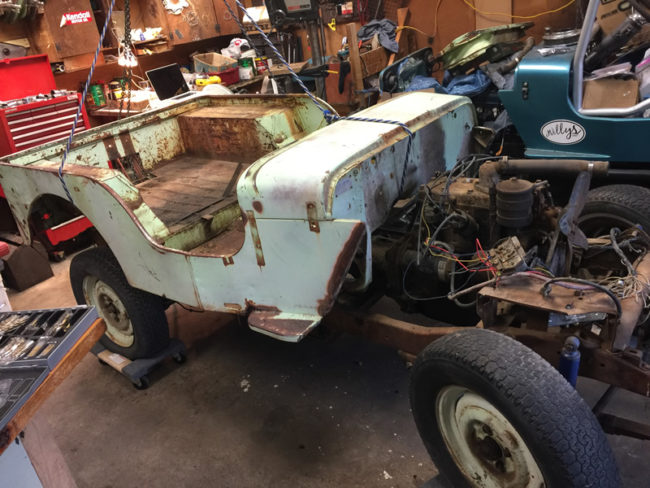
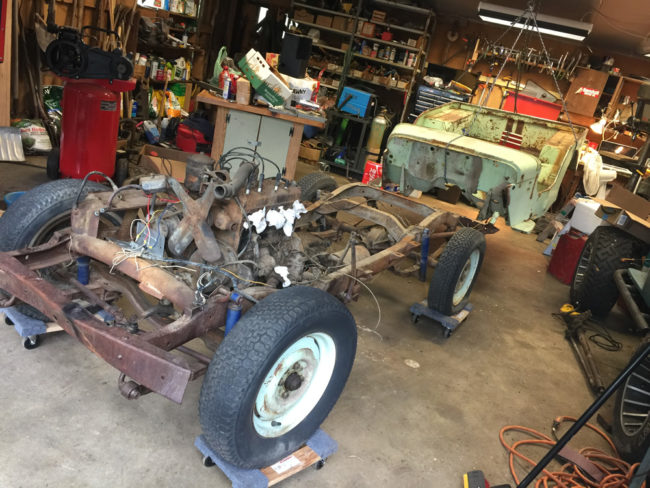
This photo and caption were published in the February 1945 issue of Popular Mechanics.
Looks like a photo op.
“1945 PRESS PHOTO Road Signs From Oil Drums Guam Jeep 4473 Measures 6.25 X 8.25 inches”
With the rain staying away for a few days, I booked it over to Renton for a few days to work on Rusty. Here are a few of the things I did today.
I did a little more straightening to the body. This time I wanted to remove a bow along the top back. I’ve mounted a board as a straight edge. You can see the cancer in the rear.
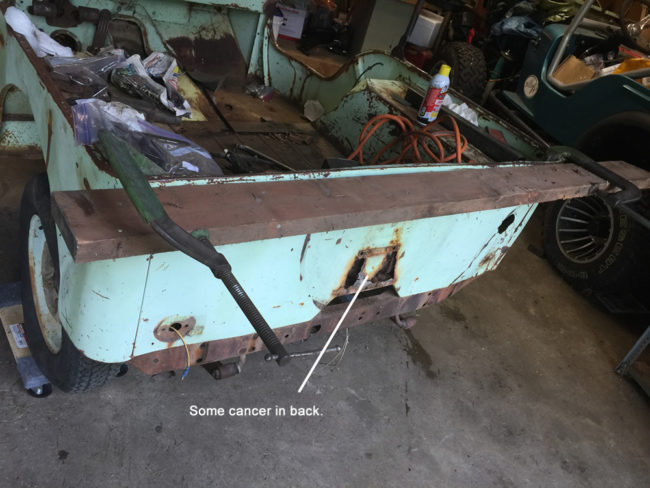 You can see there’s a gap between the board and the back.
You can see there’s a gap between the board and the back.
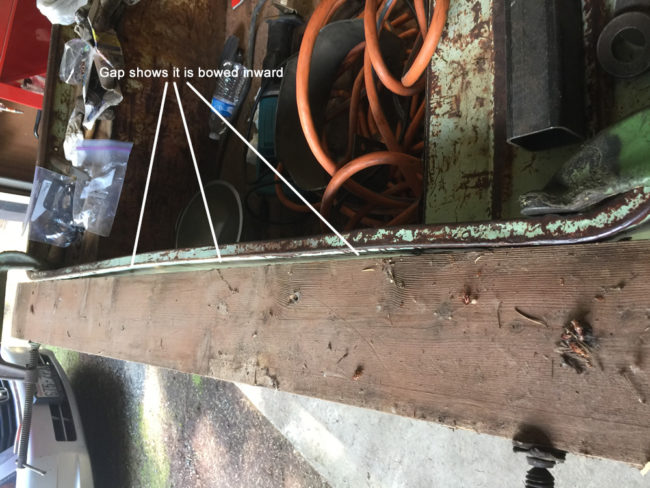 After some clamps and some sweet talking with a 5lb sledge, I coaxed the back into line.
After some clamps and some sweet talking with a 5lb sledge, I coaxed the back into line.
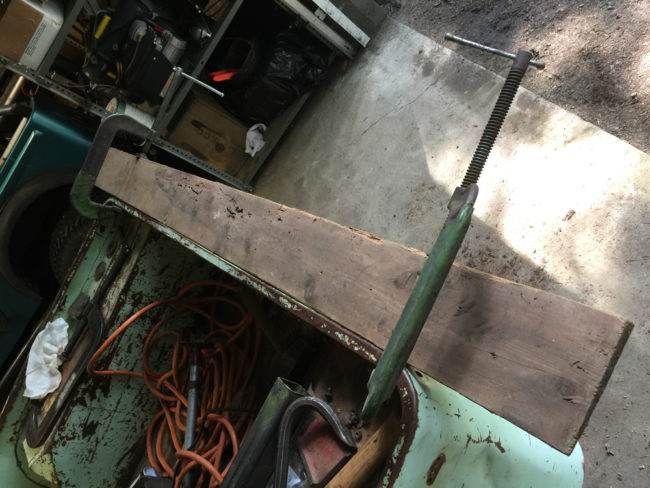
Craig shared this article about the M-38A1D.
http://autoweek.com/article/wait-theres-more/time-army-jeep-was-nuclear-launch-vehicle
It’s dated Nov 29, 1940, which is highly unlikely given this version of the jeep hadn’t been built yet. I’d guess more like late Nov 29, 1942 is more likely.
“1940 Press Photo US Military Men Directing Jeep on a Float. This is an original press photo. US Military men directing jeep on a float.Photo measures 10 x 8.25inches. Photo is dated 11-29-1940.”
This is already at $70!
1941- U.S. soldier driving a Bantam BRC-40 jeep through a creek during maneuvers in Tennessee. Photo measures approx. 7″ x 9″.
This photo and caption shows an armored jeep in the March 1945 issue of Popular Mechanics.
Harry Neilson’s brother James is selling his “Fine Art Model” 1/8 Willys on eBay. According to Harry, there were only 250 of these models made by this commpany and the model is regarded as the finest, most proportionately correct scale Willys. Here are more about the fine art jeeps here: http://www.fineartmodels.com/Jeep.html
View all the information on eBay
This sale is for a 1:8 scale Fine Art Models Willys MB Jeep produced in 1992. This model is number 60 of 250 ever produced. Numbers started at 20200900 as the hood marking and went up to 20201150. The model measures approximately 18″ long.
FAM’s model of the Willys Jeep is considered the most sought after miniature amongst Jeep enthusiasts for its attention to detail, proportions and gauges, and material usage in every respect.
Every part on these jeeps (as is the case with many of their other models) is manufactured by studying and measuring a dissasembled wartime vehicle. Parts are either soldered together or bolted; no glue is used. The sheet metal components on this vehicle are in formed brass, castings are bronze or white metal, the windshield, headlamps, parking lamps and instrument lenses are glass, shift boots and door straps are canvas, weather stripping is rubber or felt, and correct pattern Goodyear tires are made using their own molds in rubber. Continue reading
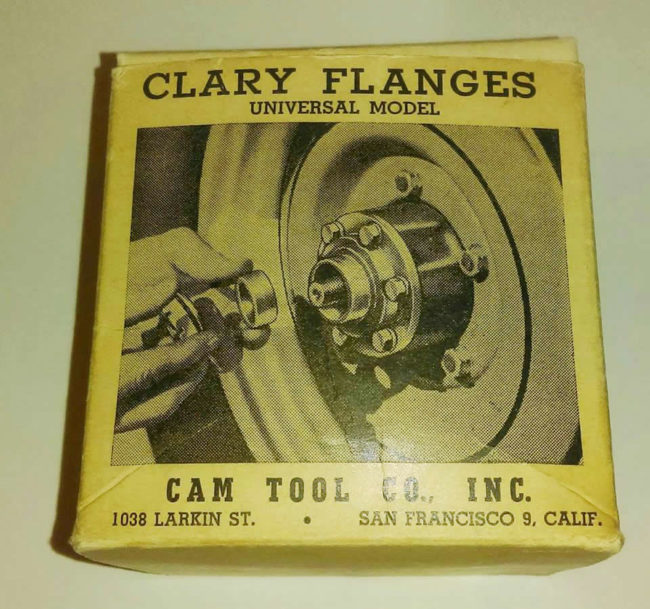 Born in 1893, Louie H. Ponnequin, a veteran of WWI, was fifty-five years old when he filed a patent in January 1948 for what appears to be the Clary Hubs. At the time, he was living in Hawaii, so it’s possible that being around the military bases there he saw a need for a simple free-spinning jeep hub. Though Arthur Warn invented his standard spinning hub cap a year earlier in 1947, there’s no evidence that Warn ever patented his “summer hub”.
Born in 1893, Louie H. Ponnequin, a veteran of WWI, was fifty-five years old when he filed a patent in January 1948 for what appears to be the Clary Hubs. At the time, he was living in Hawaii, so it’s possible that being around the military bases there he saw a need for a simple free-spinning jeep hub. Though Arthur Warn invented his standard spinning hub cap a year earlier in 1947, there’s no evidence that Warn ever patented his “summer hub”.
The Clary Flange (a couple of these pics are seen in this thread, but I don’t know the original source):
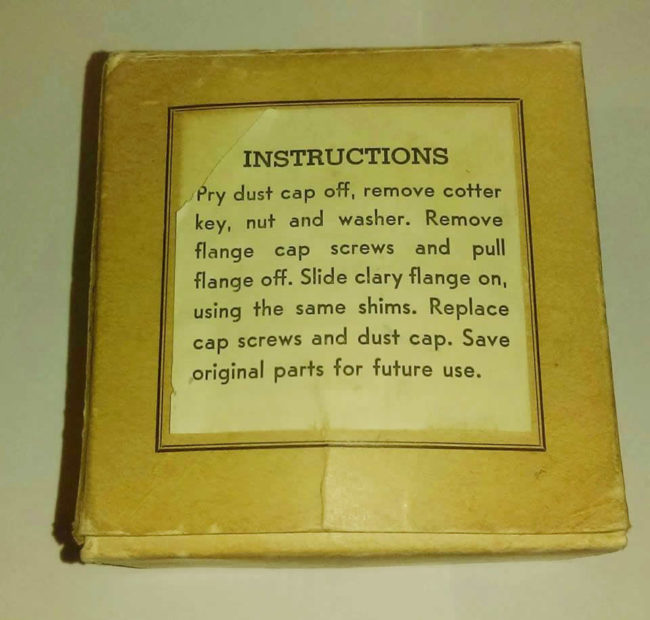
Paul Barry of Willys America shared these photos he took from the 2017 Portland Swap Meet at the Portland Expo Center. The black truck is priced at $12,000. The red wagon has no engine. The other two trucks are rough.
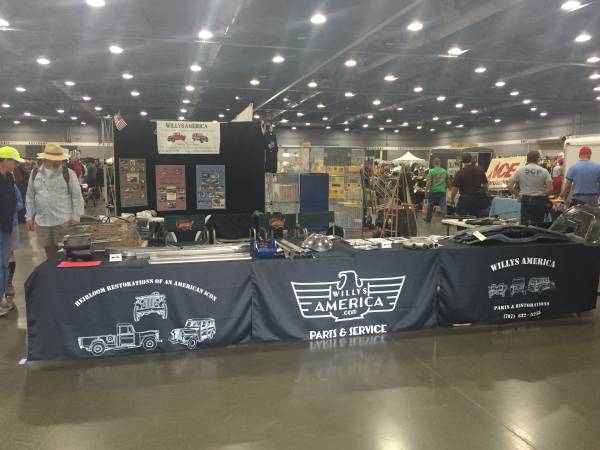
On page 41 of the April 1945 issue of Popular Mechanics is this photo and caption. Curiously, it doesn’t appear the jeep has lights; it looks more like the jeep was partly illustrated.
This photo was in the same issue:
Paul Ferrari is the new head of the East Coast Willys Association. He wanted to give an updated on the organization:
 What is the ECWA? It’s been, and we hope to keep it up as a group of people with a passion for the Willys Jeep. An unofficial club, with a forum and Facebook presence, where people can share Willys and Jeep info, stories and projects etc. The only rules are to have fun with your Jeep, help each other out, and treat each other with respect. We are hoping members will generate events like Jeep runs, tech days etc.
What is the ECWA? It’s been, and we hope to keep it up as a group of people with a passion for the Willys Jeep. An unofficial club, with a forum and Facebook presence, where people can share Willys and Jeep info, stories and projects etc. The only rules are to have fun with your Jeep, help each other out, and treat each other with respect. We are hoping members will generate events like Jeep runs, tech days etc.
You can find the ECWA on the web http://eastcoastwillys.proboards.com/forum & on Facebook
Another press photo from the Ford GPA tests.
“1943 PRESS PHOTO Army Ford Amphibian Peep Rouge River Detroit 4294 Measures 6.5 X 9 inches”